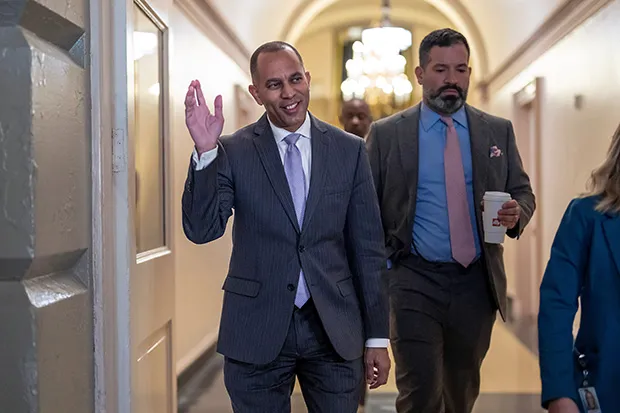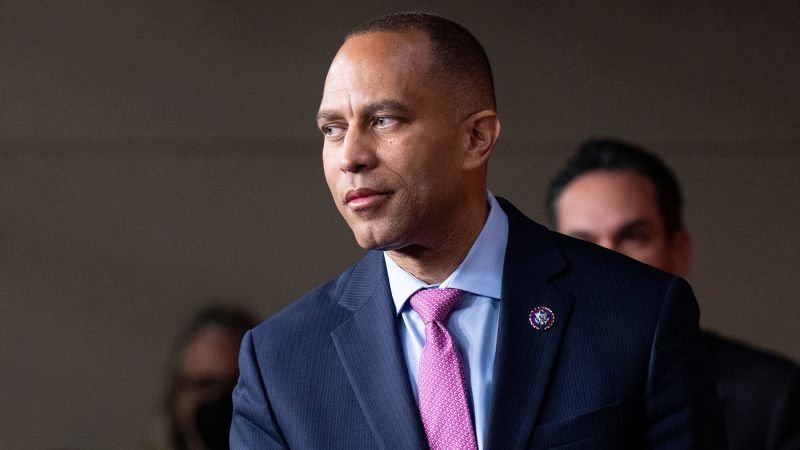| In Short |
| Jeffries slams GOP’s government funding plan as extreme and partisan. |
| The proposal pairs a six-month CR with the SAVE Act, backed by Trump. |
| Democrats push for a shorter stopgap to conclude funding by year-end. |
| GOP emphasizes election integrity, with the SAVE Act as a key issue. |
| The House vote could be pivotal, with the Senate’s stance still uncertain. |
In a blistering letter to his Democratic colleagues, House Minority Leader Hakeem Jeffries, D-N.Y., declared the GOP’s stopgap funding proposal “unserious and unacceptable.” The measure, which was proposed by House Speaker Mike Johnson, R-La., would prevent a government shutdown but has received harsh criticism from Democrats because of a slew of controversial provisions that were attached.
The GOP’s Stopgap Funding Proposal
The GOP government funding proposal marries a CR of six months’ duration with the Safeguard American Voter Eligibility (SAVE) Act championed by former U.S. President Trump. That act would require proof of citizenship to register to vote, despite the fact that already under American law, only citizens can vote in American elections.
He termed the place of the SAVE Act in the funding proposal an act of partisanship, whisked by a motive to reward Trump’s Project 2025 and lambasted the GOP for attempting to make what he called radical changes in policy under the cover of a funding bill. “To avoid a GOP-induced government shutdown that would harm ordinary Americans, Congress should enact a short-term continuing resolution that will enable us to complete the appropriations process this calendar year and is free of partisan policy riders inspired by Trump’s Project 2025,” Jeffries said.
Democratic Concerns Over Timing and Content
One of the primary complaints Democrats have is the length of the continuing resolution. Jeffries and other top Democrats, including Senate Majority Leader Chuck Schumer, D-N.Y., and House Appropriations Committee ranking member Rosa DeLauro, D-Conn., have advocated for a shorter stopgap. They argue that would give Congress room to finish work on fiscal year 2025 funding before the end of the year, rather than bleeding over into the new year and well into the tenure of a new administration.

Democrats fear that the longer stopgap would give former President Trump an opening to shape government funding decisions if he wins the presidential election in 2024. Democrats are also advocating for a short continuing resolution to keep the funding process within the current political atmosphere.
GOP’s Push for Election Integrity
To Republicans, however, the question of election integrity is paramount. Including the SAVE Act in the funding proposal makes good on promises by the GOP to keep election security front-and-center with the approach of the 2024 elections. Speaker Johnson, with the backing of Trump, introduced the SAVE Act earlier this year as part of the broader GOP strategy to make sure only eligible U.S. citizens participate in elections.
While election integrity is a rallying cry for the GOP’s base, attaching the SAVE Act to the funding proposal has made the issue contentious in negotiations. Democrats see it as an extraneous, divisive measure, while Republicans say it’s a crucial safeguard on U.S. elections.
The Path Forward and Potential Implications
The razor-thin majority in the House puts more pressure on Speaker Johnson as he whips the CR-plus-SAVE Act through the chamber. At least two GOP lawmakers, Reps. Thomas Massie (Ky.) and Matt Rosendale (Mont.), have already come out against the proposal. Johnson can afford to lose only two more Republican votes if all Democrats unite against it.
Complicating matters further are five House Democrats — Reps. Henry Cuellar, Texas, Don Davis, N.C., Jared Golden, Maine, Vicente Gonzalez, Texas, and Marie Gluesenkamp Perez, Wash — who voted for the SAVE Act when it was a standalone bill in July. Their votes could prove critical in the coming House vote, amid Republican pressure on them to support the CR-plus-SAVE Act.

And even if it survives the House, its prospects in the Senate are less than clear. As Senate Majority Leader Chuck Schumer took pains to underline in a recent speech, anything that contains what he called “poison pills” or elements of “Republican extremism” will not be allowed to imperil the funding of key programs.
This legislative showdown highlights the ongoing tension between the parties as they navigate the complex process of funding the government while balancing political agendas and the looming threat of a government shutdown.
For Latest News Updates, Click Here.
